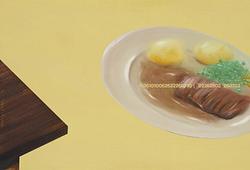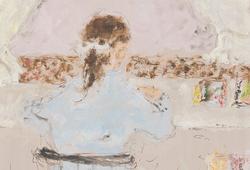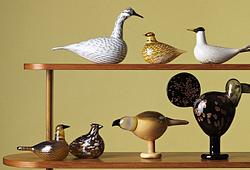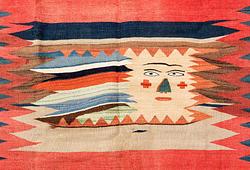SKULPTURER, ett par, porslin. Qingdynastin, Jiaqing (1796-1822).
Elefanterna är båda modellerade stående med huvudena vridna till ena sidan. Skinnet naturalistiskt bemålat med behåring. Båda bär seldon och sadel i famille rosefärger, sadeln bär upp en vas bemålad med lotusscroll. Träställ medföljer. Höjd med ställ 38 cm.
Nagg. Ena vasens fäste med skada. Två glasyrsprickor på undersidan.
Proveniens
From the Collection of James Keiller. James Keiller (1867-1962), a Swedish Businessman. Studied at Chalmers tekniska institute and Polytechnikum in Zurich. Italian envoyé from 1910 and Cabinet Chamberlain at the Royal Court from 1922.
His interest were stirred early on, and only enhanced by the masses of porcelain that he and his brother in law brought up 1905-07 from the sunken Eastindiaman Gothenburg. His wife Alice accompanied him regularly on trips to buy Chinese porcelain and antiques. His collection comprised more than 2500 pieces. In 1910, he and Alice traveled to China to acquire more pieces. His adventures are documented in a handwritten journal by Alice. The elephants are mentioned in an article as bought by the Couple in Paris in 1908.
Utställningar
A similar pair of elephants dated to the 18th-19th century, also bearing flanged gu vases, was sold at Christie's New York, 21-22 March 2013, lot 1563.
Also a similar pair of elephants dated to the Qianlong period was sold at Chrisite's, May 9th 2017, lot 95.
A pair of slightly smaller caparisoned elephants belonging to the Edward T. Chow Collection, bearing unflanged gu vases dating to the 19th century, were sold in Sotheby's Hong Kong, 19 May 1981, lot 598.
Litteratur
An article of his home in Svenska Hem i ord och bild, 1921, depicts some of his collection. See page 89-101. The elephants depicted on page 93.
Compare with an elephant in the Palace Museum, Beijing, attributed to the Qianlong period, decorated in the same palette save for the saddle is illustrated in Yinliuzhai shuoci yizhu (Commentary on Porcelain from the Studio of Drinking Streams), Beijing, 2005, p. 450, fig. 9-43.
A pair of closely related elephants can be found in the Copeland Collection, in the Peabody Essex Museum, Salem, is illustrated in W. Sargent, The Copeland Collection - Chinese and Japanese Ceramic Figures, Milan, 1991, pp. 196-97, no. 94.
David Howard & John Ayers; Compare a another pair in China for the West, page 610.
Övrig information
The imagery of an elephant carrying a vase represents the rebus taiping youxiang, which may be translated as 'may there be a peaceful reign'. This auspicious theme can be seen not only in porcelain like the present lot, but also in other media such as cloisonné enamels, metalwork, jades, and paintings.
































































